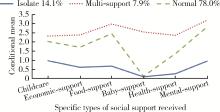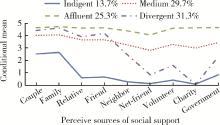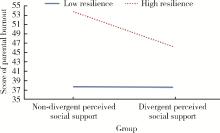Journal of Peking University (Health Sciences) ›› 2022, Vol. 54 ›› Issue (3): 520-525. doi: 10.19723/j.issn.1671-167X.2022.03.018
Previous Articles Next Articles
Relationship between social support and parental burnout in COVID-19 among Chinese young parents
Ming-long CHEN,Xiao-han LIU,jing GUO*( )
)
- Department of Health Policy and Management, Peking University School of Public Health, Beijing 100191, China
CLC Number:
- R193.3
| 1 | Huang Y , Zhao N . Corrigendum to generalized anxiety disorder, depressive symptoms and sleep quality during COVID-19 outbreak in China: a web-based cross-sectional survey[J]. Psychiatry Res, 2021, 299 (4): 113803. |
| 2 |
Rajkumar RP . COVID-19 and mental health: a review of the exis-ting literature[J]. Asian J Psychiatr, 2020, 52, 102066.
doi: 10.1016/j.ajp.2020.102066 |
| 3 | Adams E , Smith D , Caccavale LJ , et al. Parents are stressed! Factors that influence parenting during COVID-19[J]. Ann Behav Med, 2021, 55, S340. |
| 4 |
Lindstr MC , Man J , Norberg AL . Parental burnout in relation to sociodemographic, psychosocial and personality factors as well as disease duration and glycaemic control in children with type 1 diabetes mellitus[J]. Acta Paediatrica, 2011, 100 (7): 1011- 1017.
doi: 10.1111/j.1651-2227.2011.02198.x |
| 5 |
Aunola K , Sorkkila M , Tolvanen A . Validity of the finnish version of the parental burnout assessment (PBA)[J]. Scand J Psychol, 2020, 61 (5): 714- 722.
doi: 10.1111/sjop.12654 |
| 6 |
Gariepy G , Honkaniemi H , Quesnel-Vallee A . Social support and protection from depression: systematic review of current findings in Western countries[J]. Br J Psychiatry, 2016, 209 (4): 284- 293.
doi: 10.1192/bjp.bp.115.169094 |
| 7 | Hou J , Yu Q , Lan X . COVID-19 infection risk and depressive symptoms among young adults during quarantine: the moderating role of grit and social support[J]. Psychiatry Res, 2021, 11, 577942. |
| 8 |
Wise AE , Smith BC , Armelie AP , et al. Age moderates the relationship between source of social support and mental health in racial minority lesbian, gay, and bisexual youth[J]. J Health Psychol, 2019, 24 (7): 888- 897.
doi: 10.1177/1359105316686667 |
| 9 |
Roskam I , Brianda ME , Mikolajczak M . A step forward in the conceptualization and measurement of parental burnout: the parental burnout assessment (PBA)[J]. Front Psychol, 2018, 9, 758.
doi: 10.3389/fpsyg.2018.00758 |
| 10 |
Tian J , Hong JS . Validation of the Chinese version of the resi-lience scale and its cutoff score for detecting low resilience in Chinese cancer patients[J]. Support Care Cancer, 2013, 21 (5): 1497- 1502.
doi: 10.1007/s00520-012-1699-x |
| 11 |
Spurk D , Hirschi A , Wang M , et al. Latent profile analysis: a review and "how to" guide of its application within vocational beha-vior research[J]. J Vocat Behav, 2020, 120, 103445.
doi: 10.1016/j.jvb.2020.103445 |
| 12 | 黎熙元, 陈福平. 社区论辩: 转型期中国城市社区的形态转变[J]. 社会学研究, 2008, 23 (2): 192- 217.192-217, 246 |
| 13 | 程华斌, 刘霞, 李艺敏, 等. 养育是一种幸福的体验吗? 养育倦怠述评[J]. 心理发展与教育, 2021, 37 (1): 146- 152. |
| 14 | Gromada A, Richardson D, Rees G. Childcare in a global crisis: the impact of COVID-19 on work and family life[J]. (2020-06-12)[2021-03-16]. http://www.cokmed.net/ps-sistem/dosyalar/kutuphane/Childcare%20in%20Global%20Crisis%20-%20Impact%20of%20Covid-19%20on%20Work%20and%20Family%20Life.pdf. |
| 15 | 乔倩倩, 贾志科. "抗逆力"研究现状述评与展望[J]. 社会工作, 2014, 16 (5): 140- 149.140-149, 156 |
| 16 |
Howie-Davies R , McKenzie K . Diagnosis, information and stress in parents of children with a learning disability[J]. Learn Disabil P, 2007, 10 (8): 28- 33.
doi: 10.7748/ldp2007.10.10.8.28.c4281 |
| 17 |
Hauser-Cram P , Warfield ME , Shonkoff JP , et al. Children with disabilities: a longitudinal study of child development and parent well-being[J]. Monogr Soc Res Child Dev, 2001, 66 (3): 1- 11.
doi: 10.1111/1540-5834.00151 |
| 18 |
叶俊杰. 领悟社会支持、实际社会支持与大学生抑郁[J]. 心理科学, 2006, 29 (5): 1141- 1143.1141-1143, 1131
doi: 10.3969/j.issn.1671-6981.2006.05.027 |
| 19 | 熊峰, 林涌波, 周静, 等. 常态化疫情防控下医务人员职业倦怠与社会支持相关性分析[J]. 公共卫生与预防医学, 2021, 32 (4): 113- 115. |
| 20 |
Shepherd D , Goedeke S , Landon J , et al. The types and functions of social supports used by parents caring for a child with autism spectrum disorder[J]. J Autism Dev Disord, 2020, 50 (4): 1337- 1352.
doi: 10.1007/s10803-019-04359-5 |
| 21 |
王波, 王倩. 特殊儿童父母养育倦怠研究进展[J]. 中国特殊教育, 2021, 28 (7): 26- 32.
doi: 10.3969/j.issn.1007-3728.2021.07.006 |
| [1] | Shan CAI,Yihang ZHANG,Ziyue CHEN,Yunfe LIU,Jiajia DANG,Di SHI,Jiaxin LI,Tianyu HUANG,Jun MA,Yi SONG. Status and pathways of factors influencing physical activity time among elementary and junior high school students in Beijing [J]. Journal of Peking University (Health Sciences), 2024, 56(3): 403-410. |
| [2] | Xin LIU,Xueying SHI,Jun LI. A case of COVID-19 associated ischemic colitis [J]. Journal of Peking University (Health Sciences), 2024, 56(2): 362-365. |
| [3] | Jinrong ZHU,Yana ZHAO,Wei HUANG,Weiwei ZHAO,Yue WANG,Song WANG,Chunyan SU. Clinical characteristics of COVID-19 infection in patients undergoing hemodialysis [J]. Journal of Peking University (Health Sciences), 2024, 56(2): 267-272. |
| [4] | Jian-bin LI,Meng-na LYU,Qiang CHI,Yi-lin PENG,Peng-cheng LIU,Rui WU. Early prediction of severe COVID-19 in patients with Sjögren’s syndrome [J]. Journal of Peking University (Health Sciences), 2023, 55(6): 1007-1012. |
| [5] | Jin-hui LAI,Qi WANG,Jia-xiang JI,Ming-rui WANG,Xin-wei TANG,Ke-xin XU,Tao XU,Hao HU. Effects of delayed ureteral stents removal during the COVID-19 pandemic on the quality of life and psychological status of postoperative patients with urinary calculi [J]. Journal of Peking University (Health Sciences), 2023, 55(5): 857-864. |
| [6] | Zhi-yu KANG,Lei-lei WANG,Yong-zheng HAN,Xiang-yang GUO. Anesthesia management of athletes' operation in Beijing Olympic Winter Games [J]. Journal of Peking University (Health Sciences), 2022, 54(4): 770-773. |
| [7] | Hong MENG,Li-na JI,Jing HUANG,Shuang CHAO,Jia-wen ZHOU,Xue-jun LI,Xiao-mei YIN,Li-rong FAN. Analysis of the changes and characteristics of pediatric outpatient visits in a general hospital in Beijing before and after the COVID-19 pandemic [J]. Journal of Peking University (Health Sciences), 2021, 53(5): 952-956. |
| [8] | HUANG Bing, WANG Hong-yuan. Analysis of the development trend and severity of the COVID-19 panidemic in the global world [J]. Journal of Peking University (Health Sciences), 2021, 53(3): 536-542. |
| [9] | CHEN Ping,LI Ze-ming,GUO Yi,SUN Xin-ying,Edwin B. FISHER. To explore medication adherence of patients with type 2 diabetes mellitus using the latent profile analysis based on the Big Five personality theory [J]. Journal of Peking University (Health Sciences), 2021, 53(3): 530-535. |
| [10] | Qiu WANG,Jin-yu GUO,Hong SUN,Ling WANG,Ju-su YING,Hui-xin LIU. Investigation of protective exposure risk events in nurses against corona virus disease 2019 in Wuhan [J]. Journal of Peking University (Health Sciences), 2020, 52(4): 711-714. |
| [11] | Hang YANG,Lin-cheng YANG,Rui-tao ZHANG,Yun-peng LING,Qing-gang GE. Risks factors for death among COVID-19 patients combined with hypertension, coronary heart disease or diabetes [J]. Journal of Peking University (Health Sciences), 2020, 52(3): 420-424. |
| [12] | Mei-lian CHEN,Yan GAO,Wei GUO,Li ZUO,Tian-bing WANG. Infection prevention and control of bedside blood purification treatment in patients with COVID-19 [J]. Journal of Peking University (Health Sciences), 2020, 52(3): 414-419. |
| [13] | Wen FENG,Liang-nan ZHANG,Jing-yuan LI,Tian WEI,Ting-ting PENG,Dong-xu ZHANG,Zai-xin GUO,Wei-song WANG. Analysis of special ehealth service for corona virus disease 2019 (COVID-19) pneumonia [J]. Journal of Peking University (Health Sciences), 2020, 52(2): 302-307. |
| [14] | ZHANG Xu-xi, WU Shi-yan, WANG Feng-bin, Mayinuer YUSUFU, SUN Kai-ge, HU Kang, ZHANG Xing, SUN Xin-ying, Edwin B. FISHER. Association between social support and self-management behaviors among patients with diabetes in community [J]. Journal of Peking University(Health Sciences), 2017, 49(3): 455-461. |
|
||





